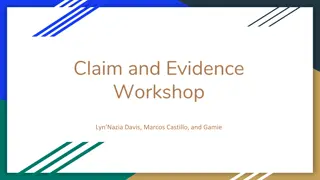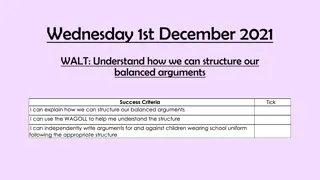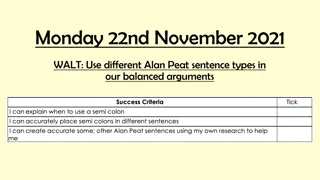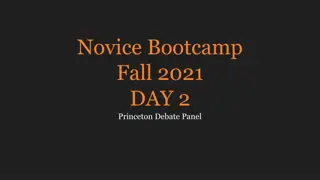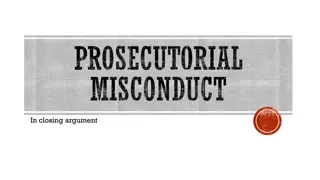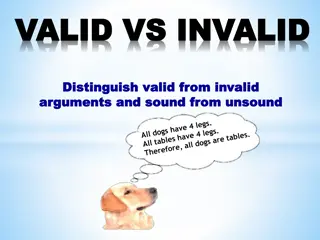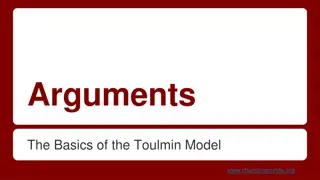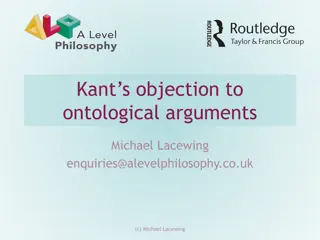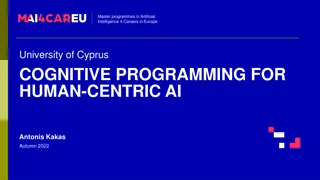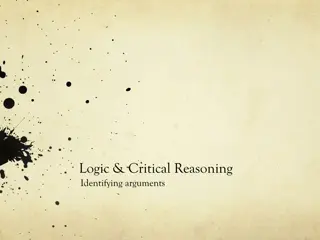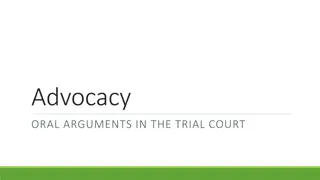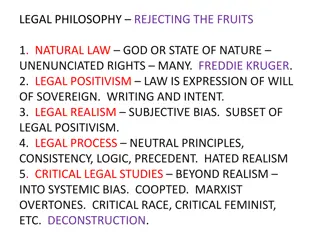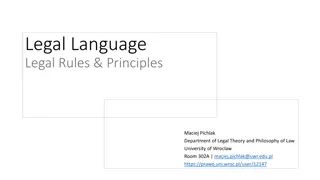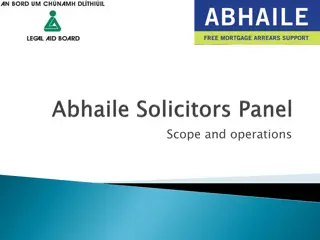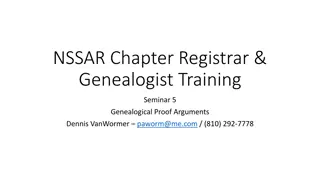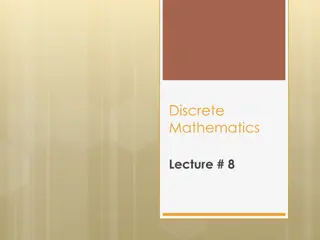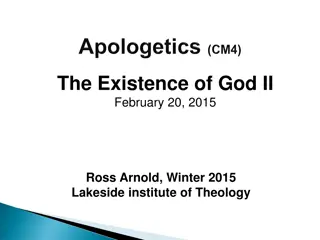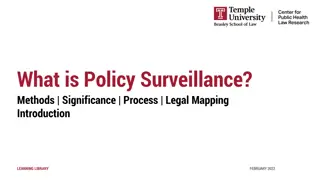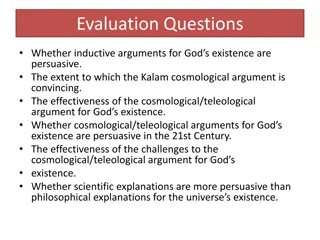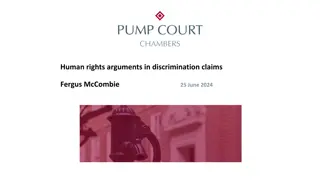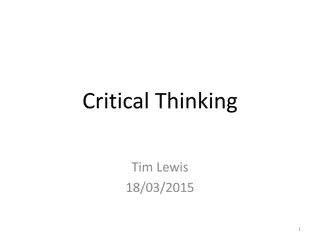Mastering the Toulmin Method for Constructing Persuasive Arguments
Learn how to effectively structure arguments using the Toulmin Method, which consists of Claim, Data, Warrant, Backing, Counterclaim, and Rebuttal elements. Explore reasoning and logic concepts, differentiate between inductive and deductive reasoning, and understand how to construct valid arguments
0 views • 30 slides
Understanding the Difference Between Legal Information and Legal Advice
Legal information provides facts about the law and legal processes, while legal advice offers guidance on courses of action to further interests. Legal information is like the rules of a game, explaining basics, while legal advice is akin to the strategies for winning. This article explores the dist
0 views • 12 slides
Understanding the Structure of Balanced Arguments
Explore the concept of using the third person in writing balanced arguments to maintain objectivity and structure. Learn about third person pronouns and the importance of being unbiased in your writing. Understand the significance of structuring your arguments and maintaining a clear order for effec
0 views • 11 slides
Mastering Alan Peat's Balanced Arguments with Different Sentence Types
Explore the use of various Alan Peat sentence types in crafting balanced arguments, focusing on incorporating semi-colons effectively. Engage in interactive activities and practice sessions to enhance your skills in creating compelling arguments. Dive into examples and exercises to refine your under
1 views • 12 slides
Mastering Debate: Essential Strategies and Techniques
Learn key concepts like argument structure, points of clarification, and how to make compelling arguments in a debate setting. Discover the importance of warrants, impacts, and implications in formulating strong arguments. Explore tips on coming up with effective arguments and understanding differen
0 views • 47 slides
Mastering Final Focus in Debates
Final Focus, a crucial 2-minute speech at the end of a debate, serves as your last chance to persuade the judge of your victory. It involves comparing key voters and emphasizing the impact of your arguments. Weighing key voters is essential, with a focus on demonstrating why the scale tips in your f
1 views • 4 slides
Role and Responsibility of Legal Aid Panel Lawyers Presentation
The presentation by Rajasthan State Legal Services Authority discusses the vital role of legal aid panel lawyers in providing legal services to the marginalized and weaker sections of society. It emphasizes the responsibilities of panel lawyers in offering competent legal assistance, spreading legal
0 views • 22 slides
Understanding Reasonable Arguments vs. Pseudo-Arguments
The provided content focuses on distinguishing between reasonable arguments and pseudo-arguments through thought-provoking questions such as the ethical treatment of animals, city subsidies for sports venues, and subjective opinions on aesthetics. It also explains the structure of an argument, highl
0 views • 18 slides
Enhancing Quality Standards of Legal Clinical Education in Ukraine
The Association of Legal Clinics of Ukraine (ALCU) is dedicated to promoting high-quality legal clinical education in the country. They have established standards and assessment tools to ensure the effectiveness of legal clinics, with a focus on providing free legal aid and raising legal awareness.
1 views • 10 slides
Understanding Prosecutorial Misconduct in Closing Arguments
Explore the duty and obligations of prosecutors in presenting evidence fairly, the prevalence of prosecutorial misconduct, and the impact on legal proceedings. Learn about vouching, different types of prosecutorial misconduct in closing arguments, and key legal cases defining the boundaries of prose
5 views • 46 slides
Understanding Valid and Invalid Arguments in Logic
In logic, arguments consist of premises supporting a conclusion, with deductive arguments claiming logical necessity. Valid arguments have premises implying the conclusion, making them deductively valid. For example, if all actors are robots and Tom Cruise is an actor, then logically Tom Cruise must
0 views • 25 slides
An Examination of Ontological Arguments for God's Necessary Existence
Various ontological arguments, such as Malcolm's and Anselm's, propose that the existence of God is logically necessary, grounded in the concept of God as the greatest possible being. These arguments challenge the coherence of the concept of God and counter objections, like Kant's claim that existen
2 views • 10 slides
Understanding the Toulmin Model for Effective Argumentation
The Toulmin Model provides a structured approach to crafting and evaluating arguments, consisting of key components like claims, grounds/data, and warrants. It emphasizes the importance of using evidence and reasoning to support claims effectively. By understanding this model, one can enhance the pe
0 views • 13 slides
Kant's Critique of Ontological Arguments
An exploration of Kant's objection to ontological arguments, examining the flaws in the reasoning of Anselm and Descartes. Kant argues that existence is not a predicate and does not enhance the concept of a being. Therefore, ontological arguments cannot prove the existence of God solely through conc
0 views • 7 slides
Understanding Argumentation and Realization in AI Master Programmes
Exploring the concept of argumentation and its realization in artificial intelligence master programmes, focusing on the construction, evaluation, and implementation of arguments through cognitive programming. The framework involves structured argumentation, conflict relations, and strength/preferen
1 views • 31 slides
Access to Justice Through Public Legal Education in Alberta
The Centre for Public Legal Education Alberta (CPLEA) is a not-for-profit organization offering plain language legal education and information to empower individuals in understanding their rights and responsibilities. Public Legal Education (PLE) helps people address legal issues independently by pr
0 views • 20 slides
Understanding Logic and Critical Reasoning: Identifying Arguments
In the study of logic and critical reasoning, identifying arguments is a fundamental task. Arguments consist of premises supporting a conclusion, and they can be identified by specific indicators and techniques. Understanding argument structure and types of support, such as deductive and inductive,
2 views • 15 slides
Guide to Oral Arguments in Trial Court
Learn how to conduct oral arguments in a trial court, including the steps for both the movant and respondent, strategies for making strong arguments, and tips for responding effectively. This comprehensive guide covers the dos and don'ts of oral arguments, emphasizing the importance of preparation,
0 views • 9 slides
Supporters of Slavery in the 19th Century: Legal, Religious, and Economic Arguments
In the 19th century, defenders of slavery utilized legal arguments by denying citizenship rights to blacks, religious arguments by justifying ownership and guidance through biblical references, and economic arguments by comparing treatment of slaves in the South to conditions of workers in the North
0 views • 4 slides
Understanding Command-line Arguments and Errors
Learn how to utilize command-line arguments in Python scripts to enhance flexibility and parametrize functions for various inputs. Explore ways to access and utilize command-line arguments effectively, while handling errors gracefully.
0 views • 30 slides
Understanding Legal Philosophy: Rejection of Traditional Frameworks
Explore various schools of legal philosophy such as natural law, legal positivism, legal realism, legal process, and critical legal studies. Discover the evolution of civil rights through key amendments and landmark cases shaping modern legal interpretations.
0 views • 194 slides
Understanding Legal Aid and Access to Justice
Legal aid is a state-funded support system aimed at providing legal assistance to individuals who cannot afford legal help. However, the availability of legal aid has been significantly impacted over the years by various acts and changes in the legal system. The unmet need for legal services arises
0 views • 22 slides
Legal Aid Provision and Access: Challenges and Solutions
Rebecca Rayment, a former Legal Aid lawyer and current Chief Executive of Manuel Bravo Project, addresses the complexities of accessing legal assistance, specifically focusing on Legal Aid for vulnerable asylum seekers and migrants. The presentation delves into the current legal advice provision, ch
0 views • 15 slides
Understanding Legal Reasoning: A Comprehensive Insight
Legal reasoning involves navigating through gaps, inconsistencies, and ambiguities in the law to interpret and apply legal norms effectively. This process of validation, interpretation, and application helps legal practitioners optimize the legal system and adapt it to real-life cases. The presentat
0 views • 21 slides
Analyzing Arguments in English Debates: A Critical Approach
Explore and critique various arguments presented in English debates, including topics like dietary recommendations, digestion issues with Japanese rice, and driving skills in different weather conditions. Learn how to evaluate evidence, causality, and persuasiveness in arguments to develop critical
0 views • 19 slides
Iowa Legal Aid: Free Legal Assistance for Low-Income Iowans
Iowa Legal Aid offers free legal assistance to low-income Iowans, covering a range of civil legal issues such as family law, housing, consumer rights, and more. Services are provided through regional offices across Iowa, with easy application processes and multilingual support available. Learn how t
1 views • 26 slides
Understanding the Finnish Legal Profession of Attorneys-at-law
Attorneys-at-law in Finland are highly trained legal professionals who play a crucial role in upholding the rule of law. Only members of the Bar Association can hold this title, ensuring quality legal services for clients. The profession includes different roles such as licensed legal counsel, publi
0 views • 16 slides
Mastering Academic Writing Moves: The Art of Summarizing
In academic writing, mastering the art of summarizing is crucial for persuasive arguments. By engaging in dialogue with others and summarizing their arguments, writers can strengthen their position. It is important to strike a balance between the original author's ideas and your own, emphasizing asp
0 views • 15 slides
Evolution of Legal Aid: From Inception to Present Challenges
The evolution of legal aid from its establishment in 1949 to the current challenges faced post the Legal Aid, Sentencing and Punishment of Offenders Act 2012 has been marked by changes in funding, administration, and accessibility. Despite initial state-funded schemes and subsequent reforms, recent
0 views • 24 slides
An Overview of Debate: Propositions, Teams, and Formats
Debate is a regulated discussion between two matched sides discussing a proposition, with the affirmative arguing for change and the negative defending the status quo. The standard debate format involves constructive arguments followed by rebuttals from both sides. The roles in a debate include the
0 views • 47 slides
Legal Language, Rules, and Principles: Understanding Norm Structures and Legal Personhood
Explore the structure of legal norms, including their components - hypothesis and disposition. Learn about the addressee of norms, legal personhood, and legal capacity. Discover how in New Zealand, land and rivers have been granted personhood, akin to corporations, in legal terms. Dive into a case s
0 views • 20 slides
Legal Aid Board and Abhaile: Providing Legal Assistance to Those in Need
Legal Aid Board offers civil legal aid and advice to individuals with insufficient means, following the Civil Legal Aid Regulations. Abhaile provides financial and legal guidance to insolvent individuals at risk of losing their homes. The solicitors panel, established by the Board, ensures legal ser
0 views • 27 slides
Genealogical Proof Arguments and SAR Standard of Proof
This detailed content covers the definitions and components of genealogical proof arguments, proof summaries, and the SAR standard of proof. It explains the importance of evidence quality, source citations, and analysis in establishing acceptable genealogical conclusions for SAR membership applicati
0 views • 22 slides
Understanding Valid and Invalid Arguments in Discrete Mathematics
Concepts of valid and invalid arguments in discrete mathematics are explored through examples. Learn how to determine the validity of arguments based on premises and conclusions. Practice using truth tables to evaluate argument forms. Enhance your logical reasoning skills in Discrete Mathematics.
0 views • 22 slides
Overview of Legal Philosophy and Civil Rights Amendments
Understanding various legal philosophies such as natural law, legal positivism, legal realism, legal process, and critical legal studies, this content delves into the historical context of civil rights amendments, including the 13th, 14th, and 15th Amendments. It discusses significant cases and prov
0 views • 194 slides
Philosophical Apologetics: Arguments for the Existence of God
Philosophical apologetics presents various arguments for the existence of God, including the ontological, cosmological, teleological, moral, transcendental, and presuppositional arguments. These arguments cover diverse aspects such as change, causality, design, contingency, miracles, consciousness,
0 views • 10 slides
Understanding Policy Surveillance and Legal Mapping in Public Health Law Practice
Policy surveillance involves the systematic tracking of public health laws and policies over time and across jurisdictions using a rigorous scientific approach to generate data for evaluation and research. This process helps create legal data, build workforce legal capacity, support innovation diffu
0 views • 10 slides
Evaluating Arguments for God's Existence in the 21st Century
Exploring the persuasiveness of inductive arguments for God's existence, assessing the Kalam cosmological argument, and evaluating the effectiveness of cosmological/teleological arguments. Delving into whether scientific explanations surpass philosophical ones, the strengths and weaknesses of these
0 views • 16 slides
Legal Insights on Human Rights Arguments in Discrimination Claims
Explore key cases and concepts in discrimination claims relating to human rights, including protected beliefs under Article 9 ECHR, manifestation of belief, separability in legal context, freedom of expression, and settlement agreements in various legal disputes. Gain valuable insights into the inte
0 views • 7 slides
Understanding Critical Thinking, Hypotheses, and Arguments
Explore the concepts of critical thinking, hypotheses, and arguments in this informative content. Learn about the definition of hypotheses, the nature of arguments, and syllogisms. Delve into the world of logical reasoning and the foundations of thought processes.
0 views • 32 slides
